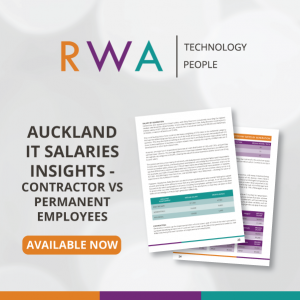 The idea that we are moving towards a more contingent IT workforce has been gaining traction. To understand what might be driving this trend, we used our first ever RWA Auckland IT Salaries Report to identify the fundamental differences between contracting and permanent employment. The data, collected from more than 2,000 Auckland IT professionals, provided fascinating insights into the Auckland IT Market as a whole, as well as why more IT professionals are choosing to move into the contingent workforce.
The idea that we are moving towards a more contingent IT workforce has been gaining traction. To understand what might be driving this trend, we used our first ever RWA Auckland IT Salaries Report to identify the fundamental differences between contracting and permanent employment. The data, collected from more than 2,000 Auckland IT professionals, provided fascinating insights into the Auckland IT Market as a whole, as well as why more IT professionals are choosing to move into the contingent workforce.
Whilst our salary report unsurprisingly found that Auckland’s IT contractors are paid more than their permanent counterparts, it also revealed just how much of an average pay gap there is, as well as some other interesting comparisons between the two types of professionals.
Differences in Salaries
It has been well documented that contractors often earn more than permanent employees. This is due to several reasons, such as an increased level of risk and the fact contractors often have very niche, in-demand skills. However, as part of our Salary Report, we decided to find out just how much average pay differed across permanent and contract remuneration.
To achieve this, we calculated the equivalent salary for a contractor based on a 46-week year to allow for unpaid holidays and statutory days, but not taking into account any gaps between contract roles. The average median salary for permanent IT employees sat at $85,000 per annum, and when this was compared to the average median contract rate of $80 per hour, our report found that contractors earn 52.49% more, at $147,200 per year. This gap was most apparent in the Project space where the gap is the highest for a specific role group at 50.54% – as well in IT Consultant, Database Developer and BI Specialist roles, where the gap sits at 92.17%, 70.81%, and 68.86% respectively.
More Contractors Are Receiving Permanent Employee Benefits
Although we have noticed a greater number of employers offering non-monetary benefits to appeal to top talent, we didn’t expect this to affect the contract market as much as it has. Our Auckland IT Salary Survey found that a surprising 56% of contractors receive some kind of non-monetary benefit. Breaking this down, we found that the two most common benefits were car parking and flexible working hours, which you might expect for contractors. However, what you wouldn’t expect is that some employers have begun offering company paid training.
22% of our total audience did not receive any non-monetary benefit at all, with the Development, Systems and Testing sectors in particular recording 31%, 24%, and 27% respectively. With that in mind, if you’re finding it difficult to attract talented contractors or permanent employees in these areas, providing additional non-monetary benefits could be what your business needs to stand out from your competition and secure top talent.
Contractors Are More Satisfied Than Permanent Employees
Although there are close similarities between the two, our report found that contractors are slightly happier than permanent employees and feel more valued at work. This is indicative of the way in which businesses are changing how they approach contractors. We’re seeing more organisations treat contractors in similar ways to their permanent employees, such as the providing additional benefits, onboarding and support, just as they would with any new hire. In essence, employers are welcoming contractors into the fold as part of their team, as opposed to just an outside contributor. However, contractors rank professional development lower in importance than permanent employees, but as most are already deep into their careers, this was expected.
Contractors being ahead of permanent employees regarding how valued they feel was another surprising find, but this could be tied to why and how contractors are engaged. Contractors are usually brought in as a special resource to fill a specific need or to work on high-profile projects, which often makes them critical to the organisation or project they are attached to. With this in mind, employers need to ensure that they don’t understate the important work their permanent workforce achieve so that they too feel valued.
Summary
With our Auckland IT Salaries Survey Report finding that contractors are happier in their working lives, have greater flexibility and make more money, we wouldn’t be surprised to find the overall number of contractors continues to rise in the coming years, with more permanent employees viewing contracting as an appealing alternative.
For more insights into the Auckland IT market, as well as a role specific index of IT salaries, get your copy of the RWA Auckland IT Salaries report today. Otherwise, if you’re interested in moving into the contingent IT workforce yourself or would like to connect with Auckland’s technology talent, get in touch today.


